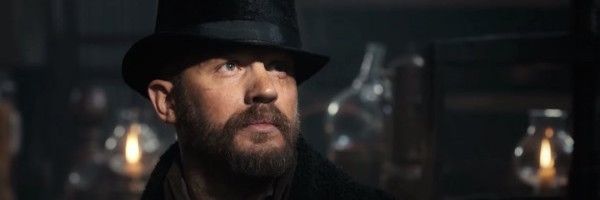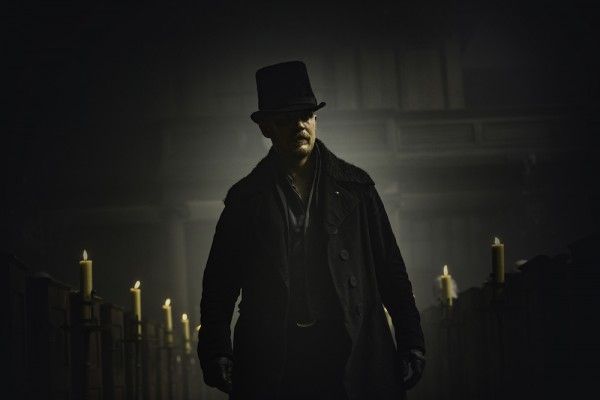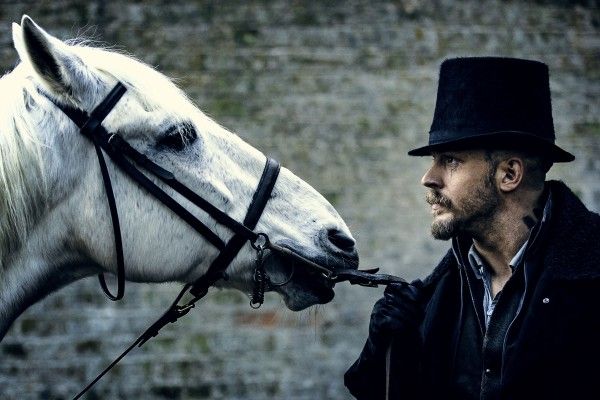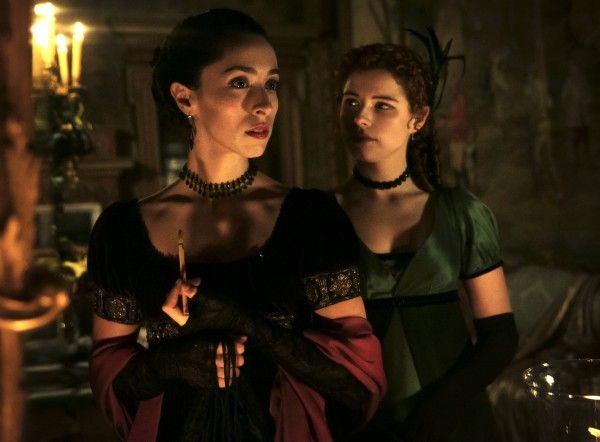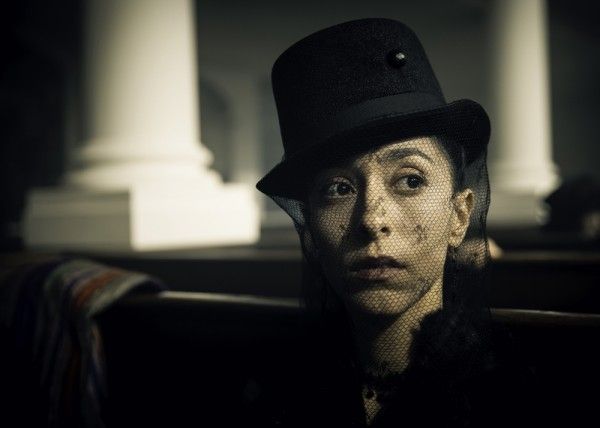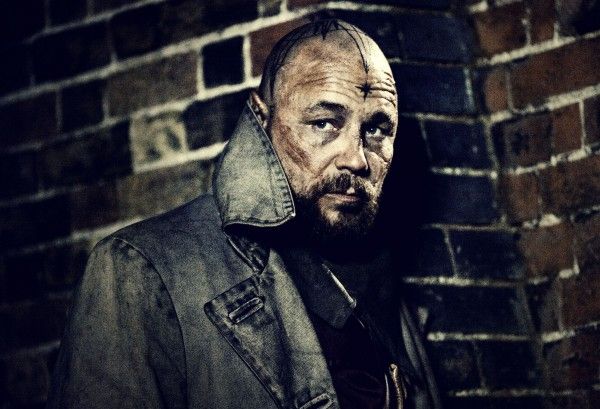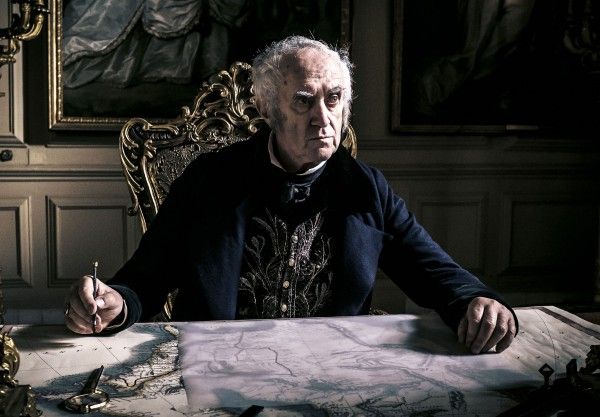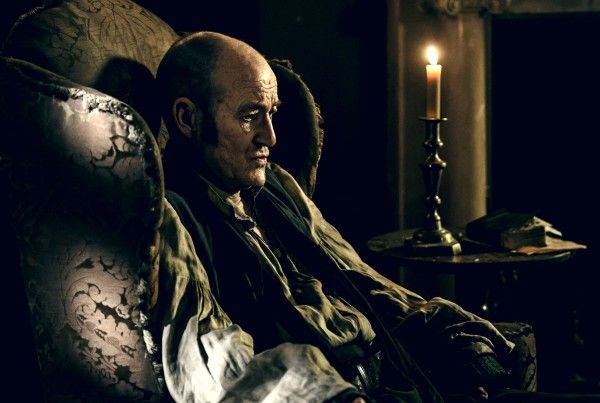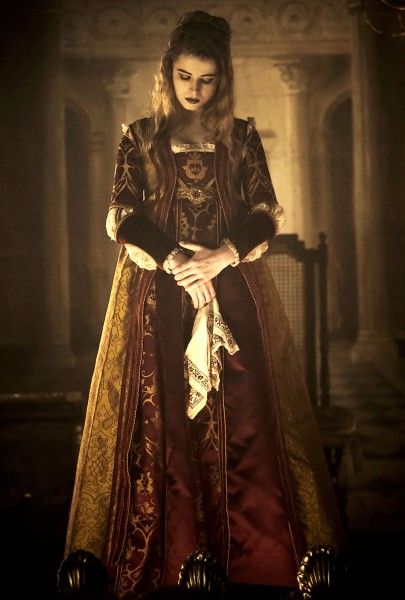Created by Steven Knight with Tom Hardy and Chips Hardy, the drama series Taboo is set in 1814 and follows James Keziah Delaney (Tom Hardy), a man believed to be long dead. After returning home to London from Africa to inherit what’s left of his father’s shipping empire and rebuild a life for himself, he quickly learns just how poisoned his father’s legacy is, as he discovers enemies lurking everywhere. With conspiracy, murder and betrayal all around him, he must unravel a dark family mystery and hope to survive it.
During this 1-on-1 interview with Collider, writer/executive producer Steven Knight talked about what appealed to him about Taboo, making a deal with Tom Hardy to do Taboo in return for him signing on for Locke, finding the history of the time period through the character, how the other characters evolved, the relationship between James Delaney and his half-sister, the journey of Season 1, and working on a second season. Be aware that there are some spoilers discussed.
Collider: This TV series started with Tom Hardy having the idea for a character he wanted to play, that he then took to his dad, and then that made its way to you. When this came your way, what interested you in it?
STEVEN KNIGHT: It was actually the first time I’d met Tom. I was invited to meet him to talk about Taboo, and it was a very open brief, which was great. It was an adventure for a character who came back to England to seek revenge. That was the basic initial idea. And while we were talking about Taboo, I was also putting together Locke, so in the same conversation, I said, “Would you want to do Locke?” I explained it, and we did a deal where he would do Locke, if I did Taboo. Then, I developed the initial idea and wrote two scripts, to begin with. And then, I ended up writing the rest.
Was it always set in this time period?
KNIGHT: No. The original idea was for the 1890s, or the turn of the century. But I was really interested, and have been for awhile, in 1813/1814. It’s a time when Britain was at war with America, Britain was at war with France, and within Britain, there was a war between the Crown and the East India Company. It’s a period where there was so much going on in London, which was then the capital of the world, and just to get a character thrown into that was the idea.
You have these cool characters in a dark, dangerous story, but you’re also teaching some history along with that.
KNIGHT: I hope so! It’s like a little history lesson, but it’s a neglected time in history because it doesn’t fit in too well with what came afterwards. Britain and America have been such close allies, since then, but this was when there was a really fierce war between the two.
Is it challenging to find a balance between the character story and the history of it?
KNIGHT: Yeah. I think you have to find the history through the character. It’s no good, trying to do it the other way around. If the character is involved in an enterprise that involves British and American governments then the politics is going to be there in each interaction, so it’s not forced. I’m trying to get a character who’s right there in the middle of history, and that’s where he can see all of the other stuff going on.
Once this had evolved, the other characters developed, and you saw where the story was going, how involved was Tom Hardy? Did he stay involved, throughout?
KNIGHT: Yeah, we would talk about the scripts, so he was pretty involved.
Did you finish writing all of the scripts before shooting started?
KNIGHT: I can’t remember. I think I finished it all, before we started shooting. It’s always better to do that. No, while they were shooting, I was finishing Episode 8. You’ve gotta avoid making decisions on the day and making things up on the day ‘cause it just doesn’t work.
How did the other characters evolve?
KNIGHT: The way I tend to work, which isn’t necessarily the most economic, in terms of time, is to have the central character and just send him off to do something. I don’t even know what he’s about to do, when I do that. An example is having him walk along the Foreshore, because you know that’s gonna look great, and then somebody comes up to him, but you genuinely don’t know who that is. And then, they have a conversation, and from that conversation, you find something out. I find the best way to make things real is to just put two characters into a space and let them talk to each other in the way that they would talk to each other, and then see what they would say. I know it sounds weird, but that leads the plot and takes you in another direction.
James Delaney seems like a character who doesn’t talk when he doesn’t want to.
KNIGHT: Absolutely!
But then, he’ll say so much. Was that intentional?
KNIGHT: Yeah, I’m always interested in characters who are closed down, but who open up when they choose to, rather than when they’re obliged to. I think that’s a very appealing thing, for an audience and just in life. I like the idea that something will say nothing, and then get straight to the point. That feels like how your heroes should be.
And it makes what he says seem that much more important.
KNIGHT: Yeah.
Tom Hardy is an actor that many people don’t know how to properly utilize, but this show and this character really utilizes his strengths. How did knowing you were writing for him affect things?
KNIGHT: It was affected by doing Locke and Peaky Blinders, as well, because we did them before we did this. It was just seeing what he does and how he does it, and then tailoring the character to what that person is. You know that he’s a chameleon. When we were doing publicity for Locke, we went to a radio station in New York and the DJ said, “I have Tom Hardy here in front of me, and I still don’t know what he looks like.” It’s not quite finished, whatever that look is. That’s great, when you’re looking for an actor.
What can you say about the journey that we’ll go on, this season?
KNIGHT: It’s a human story of one individual and the consequences of their decision to take on the world, effectively. He takes on the Americans, the British, the East India Company, the Crown, and everybody. This period is post-French Revolution and post-American Revolution, and there was also a revolution in terms of how individuals saw themselves. Individuals were separating themselves from their congregations, their religions, their families and their villages, and becoming what we recognize as a modern individual who has their own choice. People stayed in their trade, but they were starting to break away from that. He’s the precursor to the Industrial Revolution, which was about commerce and not class. Rather than the usual British way of looking at history through the prism of class, I wanted to do it through commerce. It’s all about money. You see a lot of money and coins in it. That’s what it’s all about.
It seems like wherever James Delaney goes and whatever he does, he racks up enemies who want to kill him.
KNIGHT: Yeah, but getting those enemies to fight each other is the thing, while he stands back and watches them go.
Does it keep getting more and more dangerous for him?
KNIGHT: I like to create a character where you believe, deep down, that they don’t really care if they live or die. That’s very liberating for the character because, if the character is prepared to die, then they can do anything. It’s impossible to stop them. That’s what James Delaney is.
How did the relationship between James Delaney and Zilpha Geary, his half-sister, come about? Was that less shocking, during that time period?
KNIGHT: At the time, it certainly wasn’t, no, especially a half-sister. Marriage to cousins was completely normal. A half-sister would have definitely raised eyebrows, but what people forget is that we always look back at history through the Victorian period, which was very, very moralistic. There was this great wave of a new morality in the Victorian era, when people were so horrified with the way things were in cities, with the gin joints and people with disease and promiscuity. Before that, it was hedonistic and promiscuous, so this wouldn’t have raised an eyebrow.
She seems to really want nothing to do with him, and he doesn’t seem to really have much to say to her about it.
KNIGHT: He’s a character that doesn’t want anything, or I should say doesn’t need anything. He’s either someone who doesn’t want anything, or he wants the trade, the ship and the company. Does he want it to impress her? Is that the ultimate reason? Even he probably doesn’t know, if that’s the case.
Do you see any scenario that his life takes a path where he would want to end up with her?
KNIGHT: You’ll have to wait and see. But expect the unexpected, is what I’ll say.
Is there anyone who is truly to him, and that he’s truly loyal to, or is he always manipulating?
KNIGHT: His biggest loyalty is to his father, who’s dead. He’s loyal to himself. Imagine if it doesn’t matter and nothing matters. The great Francis Bacon quote is, “[Life is] so meaningless, we may as well be extraordinary.” That’s what he’s decided. It doesn’t really matter, so he’s going to do something mad and take on the whole world, and get on a ship and go. That’s his moral code.
Would you like to continue this series for more seasons?
KNIGHT: Yeah, we’re gonna do a second season.
Taboo airs on Tuesday nights on FX.

